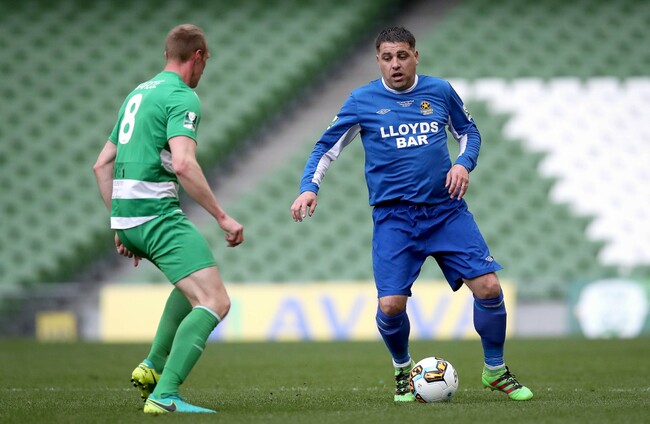JOHN LESTER HAS been devoted to football for much of his life.
At schoolboy level, he was widely regarded as one of the most talented youngsters in the country.
Despite growing up in Cabinteely, he played with Rathfarnham-based Leicester Celtic, alongside others who would go on to play senior football, including Aidan O’Keefe, Barry Roche and Pat Sullivan, with the Dublin side winning an All-Ireland title during that era.
Lester also captained a Dublin team in the Kennedy Cup and lined out for West Ham in the Milk Cup, before agreeing a move to Everton at 16.
A box-to-box midfielder, Lester ultimately did not graduate to the Toffees’ first team and left three seasons into a four-year deal.
In hindsight, Lester regrets not going sooner. He was played out of position on the wing, while a leg break in the second season there also hindered his development. Looking back, he also believes the impending ruling — which will prevent Irish youngsters moving to British clubs before they turn 18 — might have benefited him.
I was probably too young to go,” he tells The42. “It’s probably better for children not being able to go at that age. It’s good for development of players for Ireland really. They don’t need to be going at such a young age. The one people always talk about is [ex-Man United and Ireland defender] John O’Shea. He never went until he did his Leaving.”
The Dubliner continues: “I don’t know would it ever have happened at Everton for me really [had the leg break not occurred]. It might have made a bit of a difference. I might have been able to get out, or play more reserve games.
“With me being the first of my family ever being involved, you’re kind of a bit naïve with what’s going on and knowing how it works. I didn’t have an agent. I didn’t really have any contacts within football to guide me.
“If one of my children became good, I’d have a lot more knowledge about it and be able to point them in the right direction.”
In contrast with some Irish youngsters who don’t make the grade in England, Lester was “delighted” to come home.
He signed for Bohs in 2001, when they were one of the best sides in the country and competing in Champions League qualifiers, with players of the calibre of Kevin Hunt and Glen Crowe part of the squad.
After succeeding Pete Mahon as manager, Stephen Kenny sent Lester on loan to Monaghan, where he enjoyed a successful stint, making the First Division Team of the Year.
“You learn more as you get older,” he says. “People are saying shit like ‘I’m going for experience this week’. You’re trying to figure out what he means by that. I know now, because I am one of the experienced players when I’m playing, but when you’re young, you don’t really take it that well. It annoys you when you’re not able to play week in week out.”
After struggling to establish himself at Bohs, Lester never really found a long-term home in the League of Ireland thereafter.
He joined Drogheda in 2004, around the time the club were making plans to go fully pro and paving the way for their memorable league triumph in 2007. However, an injury meant he had to get a groin operation. By the time he returned, he was offered a reduced contract and so opted to leave United Park.
Between 2005 and 2011, the midfielder had stints at Waterford, Limerick, Galway, St Pat’s, Longford and Drogheda again. With the exception of Galway, which lasted two years, Lester didn’t spend longer than 12 months at any of these clubs. He puts the brevity of these spells down to the precariousness of life in the League of Ireland, with financial issues often hampering the progress of clubs.
“It might be different now with the likes of Dundalk and Shamrock Rovers. They’re steady and stable and self-sufficient. Whereas when I was playing, the league was up and down. Money was up and down. I called time on it at around [the age of] 28, because we were expecting our first child, so it was time to grow up and get a real job.”
It took a move to amateur side Sheriff in the AUL (Athletic Union League) to reignite Lester’s love for the game. It also meant he could comfortably balance playing football with work — he initially spent time as a sales rep and now has a job with his father’s freight forwarding company.
Lester found the longevity and stability he had previously been seeking in the League of Ireland amid a trophy-laden spell with Sheriff.
I was there eight seasons. We won the league seven times, we have four FAI juniors, a good few Leinster juniors and all the other cups with it.”
He says none of the team would have looked “out of place” in the League of Ireland and indeed several members of the squad were ex-Premier Division players.
After his lengthy stint at Sheriff, Lester joined current club North End United last year, linking up with fellow former League of Ireland footballer, Gary Dempsey, who was also on the books at Everton as a youngster and now manages the successful Wexford junior club.
At 38, Lester’s passion for his chosen sport remains undimmed, though much of 2020 has been characterised by frustration from his perspective.
The pandemic has meant amateur football has been restricted and is currently on hold. He can only watch on enviously, with footballers in the League of Ireland at senior and underage level, who qualify as ‘elite’, granted permission to play by the government.
“I’m not one of those types of people that are able to sit around and not do exercise,” he says.
“I just can’t get my head around why certain sports can be played, and even the likes of normal amateur people can’t play. The elite underage League of Ireland can play, but yet the Dublin District Schoolboys League at whatever age can’t play, because they don’t have an ‘elite’ title. There’s no one elite at 13, 14 and 15. It’s basically the same game of football, they just put a different name on it.
“It’s very frustrating for my two sons. One is nine, he’s not able to play matches and things like that. It’s just to get them out of the house more than anything. With Covid, I understand we all have to be careful, but you can’t have one rule for one and a completely different rule for another.”
Lester also expresses unhappiness at what he perceives as some sports being granted more leniency in this regard than others, suggesting there is an element of “double standards” at play on occasion.
“We finished last season playing the Leinster Junior behind closed doors, which is completely okay, at least we got to play,” he adds. “You’re not worried about having fans there. It’s more about people being out and getting to play at all levels. It’s very frustrating, because you’d like to see something done. I keep looking on Twitter and I see people talking about: ‘Maybe today’s the day’ that they might hear something. Some sort of breakthrough and getting back to playing.”
He feels the communication on these matters has been “terrible,” adding: “There was a little short announcement [by the FAI] that they were following government guidelines, basically to the letter what NPHET are saying. Under level three, there’s no contact or no games, apart from elite level. But I just can’t understand: ‘do you not get Covid because you’re classed as elite?’
“If you’re telling me that people in the First Division in the League of Ireland are elite, yes they might get paid a small amount of money, but I don’t think they would train much more than we would train at North End, or be better footballers, all of them, than what’s at North End and the surrounding clubs. It’s just basically because they haven’t a tag of being semi-professional, they get to play, whereas because we choose not to play at that level, we don’t get to play.
For lots of people, football is their only way of getting exercise. I have another outlet — I go out mountain biking a lot, so I don’t need a team for that. But for many people, getting out and going training [is important], some people don’t like going to the gym, some people don’t like doing 5ks or whatever.”
While aware that not everyone will agree, Lester says his frustrations are shared by the majority of footballers at his level, and feels that no distinctions should be made — either everyone or no one should be allowed to play.
“I’d just like them to be fair across the board really. You either play, or you don’t play. Either everyone’s playing, or everyone’s not playing. You can’t pick and choose who is playing. What is the difference between someone getting paid to play football and someone who is not getting paid to play football? It’s the same game. If they’re both behind closed doors, it’s exactly the same thing.
“The Premier League’s going ahead. I know they’re getting tested all the time. All it takes is for people to be tested once they come and say they don’t have it. If anyone feels sick, people are responsible, they’ll say, ‘I don’t feel great, I’ll take myself out of it,’ or ‘I won’t come around,’ or ‘I’ll get tested.’ There are loads of ways around it.
“You can go now to a restaurant, have your dinner with people around you and drink, and that’s fine, but you can’t go and play a match.
“Even if they don’t let the spectators back in yet, just let people play. People in the parks, just go out and play, and enjoy it.
“I don’t know how long I’ll play for at the level I’m playing, so it would be nice to get back at some stage.”














How come there is no mention of his Davys red card in the article??